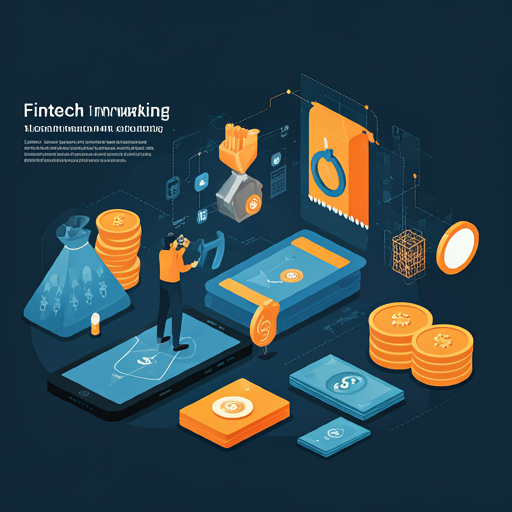Introduction to Fintech Innovations
Defining Fintech and Its Importance
Fintech, or financial technology, encompasses innovative solutions that enhance financial services. It includes various applications, such as mobile banking, peer-to-peer lending, and blockchain technology. These innovations streamline processes and improve user experiences. They make banking more accessible.
Key benefits of fintech include:
He believes that fintech is crucial for modern banking. It transforms traditional practices. This shift is exciting and necessary.
Overview of Current Trends in Fintech
Current trends in fintech highlight the rise of artificial intelligence in personal finance management. This technology analyzes spending habits and offers tailored advice. It simplifies financial decision-making. Many users find it helpful. Additionally, the integration of blockchain technology enhances transparency in transactions. This innovation builds trust among users.
Moreover, mobile payment solutions are gaining popularity. They provide convenience and speed. Users appreciate quick transactions. These trends indicate a shift towards more user-centric financial services. It’s an exciting time for fintech.
The Role of Blockchain Technology
Understanding Blockchain Basics
Blockchain technology serves as a decentralized ledger that records transactions securely. This structure enhances data integrity and reduces fraud. He recognizes its potential in various sectors. Each transaction is verified by multiple nodes, ensuring transparency. This process builds trust among users.
Furthermore, smart contracts automate agreements without intermediaries. They streamline operations and cut costs. Many businesses are adopting this innovation. It’s a game changer for efficiency.
Blockchain’s Impact on Bankibg Security
Blockchain significantly enhances banking security through its immutable ledger. This feature prevents unauthorized alterations to transaction records. He notes that this reduces fraud risks. Additionally, the decentralized nature of blockchain eliminates single points of failure. This structure increases resilience against cyberattacks.
Key benefits include:
These factors contribute to a more secure banking environment. Security is paramount in finance.
Cryptocurrencies and Their Influence
How Cryptocurrencies Are Reshaping Payments
Cryptocurrencies are revolutionizing payment systems by enabling faster and cheaper transactions. This efficiency reduces reliance on traditional banking intermediaries. He believes this shift is significant. Furthermore, cryptocurrencies facilitate cross-border payments with minimal fees. This accessibility opens new markets for businesses.
Key advantages include:
These features attract both consumers and merchants. It’s a transformative time for payments.
The Future of Digital Assets in Banking
The future of digital assets in banking is promising, as institutions increasingly adopt cryptocurrencies. This integration enhances liquidity and offers new investment opportunities. He observes that banks are exploring blockchain for efficiency. Additionally, regulatory frameworks are evolving to accommodate these assets. This adaptation fosters innovation and security.
Key trends include:
These factors indicate a shift in financial paradigms. Change is inevitable in finance.
Decentralized Finance (DeFi) Revolution
What is DeFi and How Does It Work?
Decentralized Finance, or DeFi, refers to financial services built on blockchain technology. This system eliminates intermediaries, allowing peer-to-peer transactions. He notes that this increases efficiency and reduces costs. DeFi platforms offer various services, including lending, borrowing, and trading. Users can access these services directly through smart contracts.
Key components include:
These features enhance financial accessibility. It’s a revolutionary approach to finance.
Benefits and Risks of DeFi for Traditional Banks
DeFi presents both benefits and risks for traditional banks. On one hand, it offers increased efficiency and lower transaction costs. This can enhance customer satisfaction. On the other hand, banks face competition from decentralized platforms. This disrupts their traditional business models.
Key benefits include:
However, risks involve regulatory challenges and security vulnerabilities. These factors require careful consideration. Change is happening rapidly.
Artificial Intelligence in Banking
AI Applications in Financial Services
AI applications in financial services enhance operational efficiency and decision-making. For instance, machine learning algorithms analyze vast datasets to identify trends. He believes this improves risk assessment. Additionally, AI-powered chatbots provide customer support, reducing response times. This increases customer satisfaction.
Key applications include:
These innovations streamline processes and enhance security. Efficiency is crucial in finance.
Enhancing Customer Experience with AI
AI enhances customer experience in banking by providing personalized services. For example, algorithms analyze customer data to tailor financial products. He notes that this increases customer engagement. Additionally, AI-driven chatbots offer ⁄7 support, addressing inquiries promptly. This reduces wait times significantly.
Key benefits include:
These features foster loyalty and satisfaction. Customer needs are evolving.
Regulatory Challenges and Opportunities
Navigating the Regulatory Landscape
Navigating the regulatory landscape presents both challenges and opportunities for financial institutions. Compliance with evolving regulations can be complex and costly. He believes that proactive adaptation is essential. Additionally, regulatory frameworks can foster innovation by encouraging new technologies. This can enhance operational efficiency.
Key challenges include:
However, opportunities arise from collaboration with regulators. Partnerships can drive industry standards. Change is constant in finance.
Future Regulations and Their Impact on Fintech
Future regulations in fintech present both challenges and opportunities for industry players. Compliance with evolving standards put up be complex . Companies must adapt quickly to maintain their competitive edge. Regulatory frameworks may enhance consumer trust. This trust is crucial for long-term success.
Moreover, innovation may be stifled by stringent rules. However, clear guidelines can foster a safer environment. Businesses can thrive with the right balance. He must stay informed about changes. Adapting to regulations is essential.
Conclusion: The Future of Banking
Predictions for Fintech Innovations
Fintech innovations are poised to transform banking significantly. Emerging technologies like blockchain and AI will enhance transaction security. These advancements can streamline operations and reduce costs. Efficiency is key in today’s market. Additionally, personalized financial services will become more prevalent. Customers will expect tailored solutions. This shift may disrupt traditional banking models. Adaptation is crucial for survival. The landscape is changing rapidly.
Final Thoughts on the Integration of Technology in Banking
The integration of technology in banking is reshaping the industry. Digital platforms enhance customer engagement and streamline services. This shift leads to increased operational efficiency. Efficiency drives profitability. Moreover, data analytics enables personalized financial solutions. Customers appreciate tailored experiences. Security measures must evolve alongside technological advancements. Trust is paramount in finance. Embracing innovation is essential for future success.

Leave a Reply